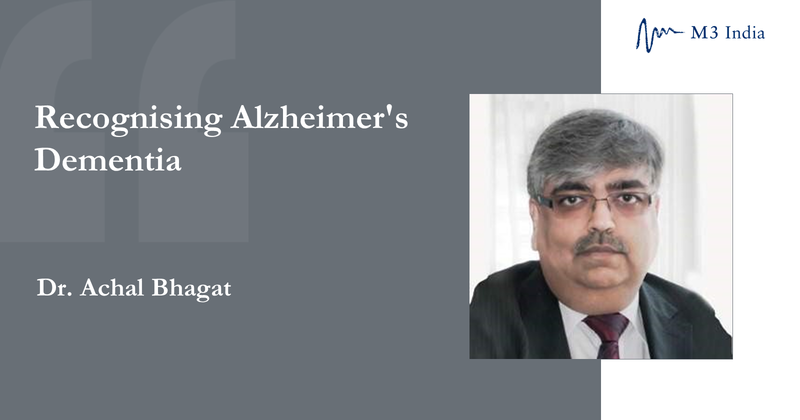Recognising Alzheimer's Dementia: Dr. Achal Bhagat
M3 India Newsdesk Sep 21, 2018
Dr. Achal Bhagat, a Senior Consultant Psychiatrist and Psychotherapist discusses the types of Dementia and the differentiating factors for Alzheimer's Dementia in Part 1 of the special series for World Alzheimer's Day.

Dementia is a commonly missed and ignored diagnosis in its early stages. It is common enough for all clinicians to come across people living with dementia in their everyday work. In 2010, the number of People living with Dementia in India was estimated to be 37 lakhs and the number is likely to have risen to more than 5 million presently. By 2050, the number is likely to reach 15 million.
Unfortunately, from early mild changes like forgetting people’s names and where one has kept the keys, to not being able to recognize your family members, the journey is difficult and traumatic. A missed opportunity of diagnosis means decreased chances of slowing the course of the illness. It also means that the person and person’s family are not able to understand why the person has changed. There is a sense of blame and guilt that persists because of lack of information. The symptoms of an illness are seen as aberrations of a personality. The stigma and confusion rise.
What is Dementia?
Dementia is not one disease process; it is a cluster of symptoms.
The decline of memory presents early and is most visible through decline in learning of new information. Gradually, as the severity of the disease progresses, sometimes the person finds it difficult even to recall previously learned information.
Apart from a decline of memory, the decline of at least one other cognitive function is essential for the diagnosis of Dementia. The other Cognitive functions include communication, language, judgment, reasoning, planning, comprehension and other thinking functions.
The person may also show emotional lability, coarsening of social skills, irritability or decreased social motivation to the extent of apathy. There may be other features like cortical symptoms: Aphasia (inability to comprehend or formulate language), Agnosia (inability to process sensory information) and Apraxia (ability to perform motor planning of tasks).
Dementia is usually diagnosed when there is a period when the person has clear consciousness to allow an assessment of memory. The severity of Dementia may be seen as mild, moderate or severe. Severity is based on whether the person living with Dementia is able to function independently or has become dependent on others to support her.
| Causes | Features |
|---|---|
| Alzheimer’s Dementia |
|
| Vascular Dementia |
|
| Frontotemporal lobar Degeneration |
|
| Parkinson’s Disease Dementia |
|
| Normal Pressure Hydrocephalus (NPH) |
|
Click here to read Part 2, which discusses the importance and need for early intervention in Dementia.
This article was originally published on 21 September 2017.
Disclaimer- The views and opinions expressed in this article are those of the author's and do not necessarily reflect the official policy or position of M3 India.
This article is contributed by Dr. Achal Bhagat, Senior Consultant Psychiatrist and Psychotherapist, Apollo Hospitals, Delhi, Chairperson, Saarthak, Chairperson, AADI.
-
Exclusive Write-ups & Webinars by KOLs
-
Daily Quiz by specialty
-
Paid Market Research Surveys
-
Case discussions, News & Journals' summaries